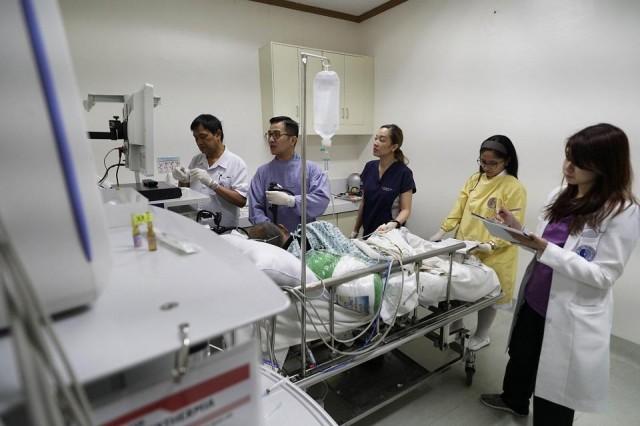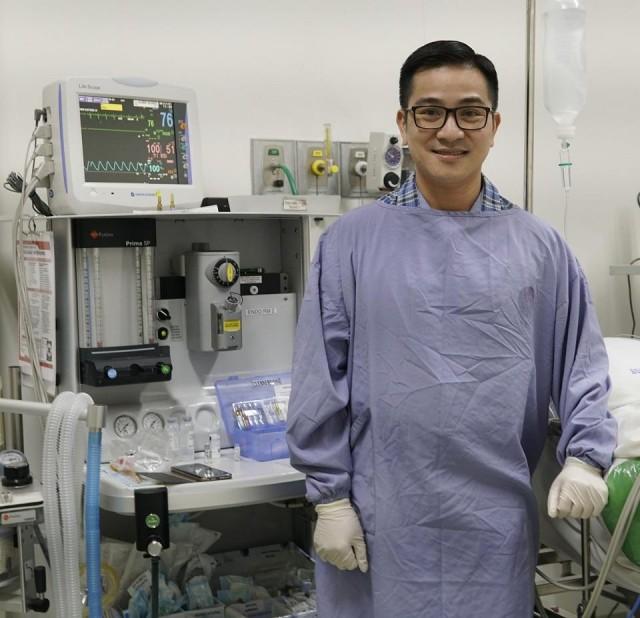NKTI specialist wants Philippines to lead ASEAN in eradicating liver diseases

A gastrointestinal and liver specialist has vowed to be a warrior in placing the Philippines at the top among ASEAN members in eradicating gastrointestinal and liver diseases.
"It’s a collective effort. The government must spend more for public hospitals—higher than what private hospitals do in eradicating gut and liver diseases," says Dr. Jade Jamias. "We need machines and technology for liver and biliary surgeries, including liver transplantation. We must lower the cost of these procedures."
The 44-year-old is the head of the National Kidney Transplant Institute's (NKTI) Liver Center, a world-class facility in liver transplant and in the management of hepatic and pancreaticobiliary disorders, "at par with the region and the country’s best private hospitals," he declares.
"But we want more patients; improved treatment; accessible vaccinations; and intensified awareness campaign. The Philippines must do more in comparison with efforts to end gut and liver diseases region-wide," Jamias admits.
The NKTI boasts of a total of 29 liver transplant operations since 1988. Twenty-one of these were performed before its Liver Center activated its transplant program from 2012 to 2014. It was designed to accommodate five liver transplant operations a year, but has only had eight cases since 2012. One patient, a 54-year-old taxi driver, underwent a successful simultaneous liver and kidney transplant operation in 2014.
"The NKTI has performed double liver-kidney, or pancreas-kidney transplant operations ahead of any other transplant center in Asia," attests NKTI executive director Dr. Rosemarie Liquete, the country’s first woman kidney transplant doctor.
"Perfecting the country’s capability to end liver problem is simultaneous with perfecting liver transplantation. The NKTI is doing that," says Jamias.
In 2014, the NKTI, the health department, and the Philippine Charity Sweepstakes Office (PCSO) signed a memorandum of agreement allowing government agencies to shoulder P1.5 million for every poor liver transplant patient, lowering NKTI’s cost to P2.5 million. The procedure costs P4 million in private institutions.
With NKTI’s 28 liver transplant cases since 1988; St Luke’s Medical Center’s 12 liver transplant operations since 2011; and Medical City’s 14 cases since 2009, the Philippines boasts of a total of 54 liver transplant cases. In comparison, Taiwan (Asia’s liver transplant center) has conducted 1,006 liver transplant operations since 1984; Singapore, a total of 276 cases since 1990.
The Philippines will catch up soon, Jamias says with optimism. The government’s free medical education program in state universities and colleges can produce more doctors. There are only 500 GI specialists and 20 liver specialists for 100 million Filipinos. Half of these specialists are based in Metro Manila.

Hepatitis awareness
Jamias, known for not wearing the traditional white of his profession, graduated from the University of Santo Tomas in 1998. He has been an internal medicine expert at the NKTI; a gastrointestinal fellow at the University of the Philippines’ Philippine General Hospital from 2003 to 2005; and a liver specialist at Sydney’s Royal Prince Albert Hospital from 2005 to 2007. He is currently the president of the Hepatology Society of the Philippines (HSP).
In 2013, HSP created its National Viral Hepatitis Task Force to push for nationwide vaccination.
"Vaccination against hepatitis A and B will eradicate viral liver problems by more than 50 percent. This can control liver diseases," says Jamias.
He adds that about 9,000 Filipinos die annually from chronic liver disease due to other causes: diabetes, fatty food intake, alcohol consumption, and taking dangerous drugs. "They can be prevented with lifestyle change," he says.
However, he also notes that about 14 million out of the Philippines' population of 100 million have hepatitis B virus.
This level, he says, is hyper-endemic, 40 percent higher than the average 28 percent in 37 member countries of World Health Organization’s Western Pacific Region, which includes the ASEAN nations.
Also, 10 percent of Filipino mothers are hepatitis B chronic carriers. Jamias says that their babies must be given hepatitis B vaccine within 24 hours of birth. Otherwise, 3 percent to 5 percent of them could develop chronic liver infections even with additional hepatitis B vaccine at six, 10, and 14 weeks after birth.
In the Philippines, free hepatitis B vaccination began with the country’s Expanded Program in Immunization (EPI) in December 1990, helping 40 percent of infants at the time. The aim then was to increase immunization by 10 percent per year, reaching 100 percent by 1999; and reduce chronic hepatitis B infection to less than 1 percent among future births, from current 10 percent to 12 percent.
At the same time, curtailing hepatitis C virus means targeting about 14,000 to 20,000 individuals who inject illegal drugs, 90 percent of whom are estimated to develop hepatitis C, which is treated with more expensive direct acting anti-virals (DAAs).
"My ambitious dream is for the elimination of viral hepatitis in the Philippines, ahead of 2030, the self-imposed deadline of the Western Pacific Region," Jamias says. — BM/RSJ, GMA News




